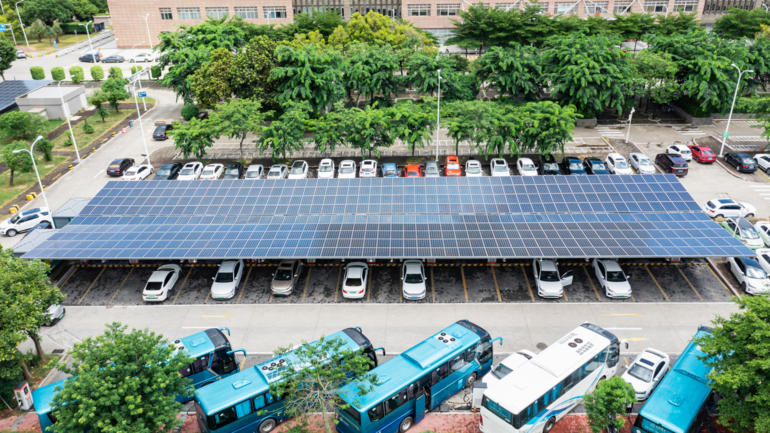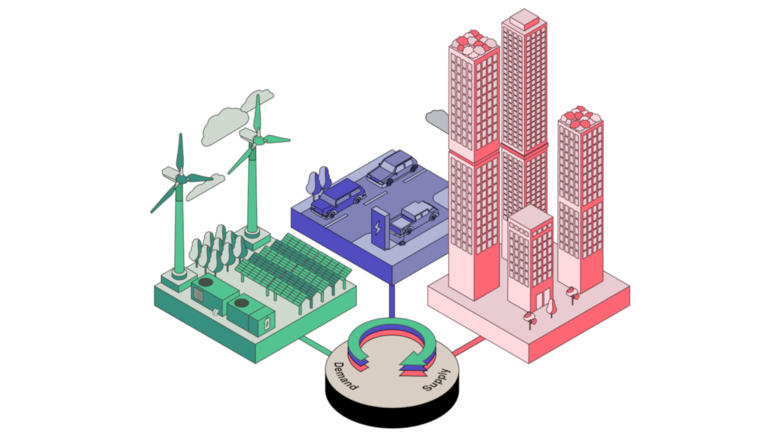Geneva/Glasgow, 10 November – Today, at COP26, the World Business Council for Sustainable Development (WBCSD) launched a new report outlining the cross-sectoral actions needed to accelerate the deployment of efficient electric vehicle (EV) fleets and sustainable charging infrastructure. Developed in collaboration with Arcadis, Arval BNP Paribas Group, Eaton, EDP, Enel X, Lanxess, Mercedes-Benz AG, Microsoft, National Grid and Nederlandse Spoorwegen, the report helps businesses and policymakers understand where to invest and how to act to bridge the infrastructure gap.
The uptake of EVs is growing globally, but the current deployment pace of sustainable and inclusive charging infrastructure is insufficient to support the expected number of 350 million electric light-duty vehicles on the roads by 2030. To reach the 1.5° goal of the Paris Agreement, we need to rapidly increase the speed and scale of investments in charging infrastructure.
The report provides a technology and policy framework for the mobility, energy and real estate sectors to enable conditions for a timely, sustainable and fair transition to 100% electric fleets, acting as a catalyst for EV growth. It highlights nine key business and policy actions at the intersection of these three sectors that can unlock shared value and improve the business case for sustainable infrastructure implementation:
- Address the needs of different EV fleets
- Maximize charging from renewables
- Establish coordinated strategic planning and management
- Incentivize and streamline charging integration
- Encourage deployment of smart grid technologies
- Engage and incentivize flexible consumers
- Agree on data-sharing principles
- Connect transport modes
- Share space and charging infrastructure
Thomas Deloison, Director, Mobility, WBCSD, said “We need coordinated action across sectors to find the right financing mechanisms that can support the expansion of charging infrastructure. Unlocking shared value through technology innovation and favorable policy frameworks will be key to accelerate the transformations needed for a net-zero, nature-positive and equitable future.
Craig McDonnell, SVP and GM, Energy Transition & Digital, EMEA at Eaton, said “With a rising number of EVs on the road, there is a critical need to have the right EV charging infrastructure in place and the right power capacity to support. Combining intelligent EV charging, power management and energy storage solutions delivers real customer benefits and ensures smarter and more sustainable energy management for the grid.”
Alberto Piglia, Head of e-mobility, Enel X, said ”As we already entered the Decade of Action, even with the progress made so far, it is crystal clear that additional actions are needed to fully capitalize on the current momentum and to push 100% EV fleet adoption into the exponential growth rate needed to meet the Global Goals.”
Peter Oosterveer, Chief Executive Officer and Chairman, Arcadis, said “As a driver of an EV, this Value Framework resonated with me as I know first-hand the shared value yet to be broadly realized across the mobility, energy and real estate sectors. The necessary industry action required to bridge this gap is addressed in the provided highly relevant use cases and serves as a key tool to accelerate decarbonization strategies within cities and business”
The group calls for the rest of the supply chain to join in aligning roadmaps for bridging the investment gap and establishing national coalitions for action. For more information about how to get involved, please contact Urska Skrt.








